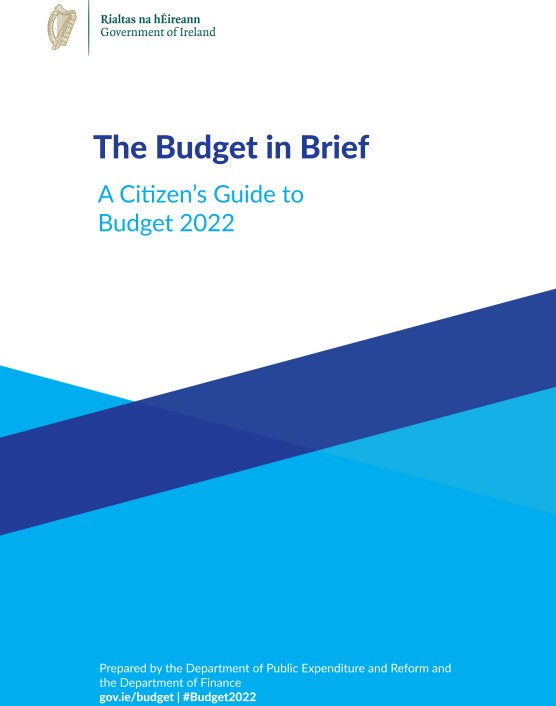CIOB Ireland responds to Budget 2022

|
The Chartered Institute of Building (CIOB) responded to Ireland’s Budget 2022 package announced on Tuesday 11 October 2021. The spending allocated amounts to about €4.7 billion. Of this, €3.2 billion has been committed to existing pay and spending increases, €1 billion will be available for new initiatives and €500 million will be allocated for tax measures.
Obviously, the public spending required for the pandemic recovery is the overarching fiscal context for this budget. However, strong economic forecasts have improved the outlook for public finances and given Minister for Finance Paschal Donohoe slightly more headroom than expected to invest.
Firstly, the Institute welcomes the continuation of the business support measures until April 2022. The pandemic wage subsidy has proved invaluable in keeping the construction sector afloat, and the measures will continue to be a welcome support as the industry returns to full capacity.
The Institute also welcomes the commitment of €30 million investment through the Ireland Strategic Investment Fund to establish an innovation equity fund with a mandate to invest in domestic, high innovation enterprises. This will be particularly useful for firms in the construction industry seeking to invest in research and development to improve productivity and deliver on the significant housing and infrastructure ambitions outlined in the updated National Development Plan.
With building and construction accounting for 39% of all carbon emissions in the world, the environmental impact of the built environment is undeniable. The Institute therefore welcomes the €360 million investment in active travel measures.
Apart from lowering Ireland’s carbon emissions, this will create employment in repair maintenance and improvement in the construction sector, as it goes about repurposing towns and cities with sustainable transport infrastructure. On a larger scale, the €1.4 billion allocated to upgrade public transport networks is timely as Ireland looks to move away from car dependent settlements and offer people more travel options.
The €200 million allocated to retrofit works on more than 20,000 existing homes will facilitate Ireland’s journey to net-zero. The Institute urges the Government to back this spending up with a coherent retrofit strategy.
There has been significant public money spent on retrofitting in the past, but the piecemeal nature of these schemes has failed to capture public imagination, with uptake remaining low. A retrofit strategy will need to address this, and concurrently put in place a skills plan to deliver the necessary works.
CIOB has long called for an ambitious national retrofit strategy to provide a clear direction of travel for the construction industry and the certainty that businesses need to create stable, green jobs beyond 2022. The construction sector is united in its message to must move towards a coherent and sustained programme of activity to improve the energy efficiency of buildings.
The institute supports the significant amount of money the budget devotes to housing, with spending set to rise to €4 billion. As the sector’s biggest client, the Government can play a direct role in arresting the cyclicality that has plagued construction in Ireland by smoothing out spending on publicly delivered housing projects.
Investing in a clear, long term pipeline of construction projects in the local-authority built housing sector will create this pipeline. CIOB urges the Government to ensure that the significant financial outlay delivers a counter cyclical pipeline of public housing projects that will given the sector the certainty it thrives on.
While the Institute welcomes the principle of a zoned land tax to reallocate the uplift in land value that flows to landowners back into the communities, it is disappointing to see the tax set at such a low rate. At 3%, the tax will be far outstripped by the inflation in the land prices, particularly in urban areas, and is therefore unlikely to be effective in incentivising the build out of zoned land. Furthermore, the zoned land tax of 3% is lower than the current vacant site tax, which is 7%. For land traders speculating on the value of zoned sites, the annual uplift in value alone would pay off the levy.
Joseph Kilroy, Policy and Public Affairs Manager for Ireland, said, “CIOB frequently emphasises the importance of a clear pipeline of projects to encourage the growth of the construction sector, to attract new entrants and to mitigate the industry’s economic cyclicality. Government, as a client, can subdue volatility in the construction sector by smoothing out public spending on construction projects. Budget 2022 commits to this spending, and the clarity it provides regarding the future of work will create an environment in which the construction sector is equipped to deliver on Ireland’s significant housing and infrastructure ambitions. However, we are concerned that the budget does not do enough to rein in the spiralling cost of land, which is having a detrimental impact on construction activity. An effective zoned land tax must outstrip the rate of land value inflation, particularly in urban areas. Furthermore, while we welcome the funds allocated to retrofitting in the residential sector, we urge the Government to publish the long awaited retrofit strategy and to provide clarity on how it will interact with the ‘Housing for All’ strategy and the new National Development Plan.”
This article originally appeared on the CIOB website. It was published on 13 October 2021.
--CIOB
[edit] Related articles on Designing Buildings
Featured articles and news
A case study and a warning to would-be developers
Creating four dwellings... after half a century of doing this job, why, oh why, is it so difficult?
Reform of the fire engineering profession
Fire Engineers Advisory Panel: Authoritative Statement, reactions and next steps.
Restoration and renewal of the Palace of Westminster
A complex project of cultural significance from full decant to EMI, opportunities and a potential a way forward.
Apprenticeships and the responsibility we share
Perspectives from the CIOB President as National Apprentice Week comes to a close.
The first line of defence against rain, wind and snow.
Building Safety recap January, 2026
What we missed at the end of last year, and at the start of this...
National Apprenticeship Week 2026, 9-15 Feb
Shining a light on the positive impacts for businesses, their apprentices and the wider economy alike.
Applications and benefits of acoustic flooring
From commercial to retail.
From solid to sprung and ribbed to raised.
Strengthening industry collaboration in Hong Kong
Hong Kong Institute of Construction and The Chartered Institute of Building sign Memorandum of Understanding.
A detailed description from the experts at Cornish Lime.
IHBC planning for growth with corporate plan development
Grow with the Institute by volunteering and CP25 consultation.
Connecting ambition and action for designers and specifiers.
Electrical skills gap deepens as apprenticeship starts fall despite surging demand says ECA.
Built environment bodies deepen joint action on EDI
B.E.Inclusive initiative agree next phase of joint equity, diversity and inclusion (EDI) action plan.
Recognising culture as key to sustainable economic growth
Creative UK Provocation paper: Culture as Growth Infrastructure.






















